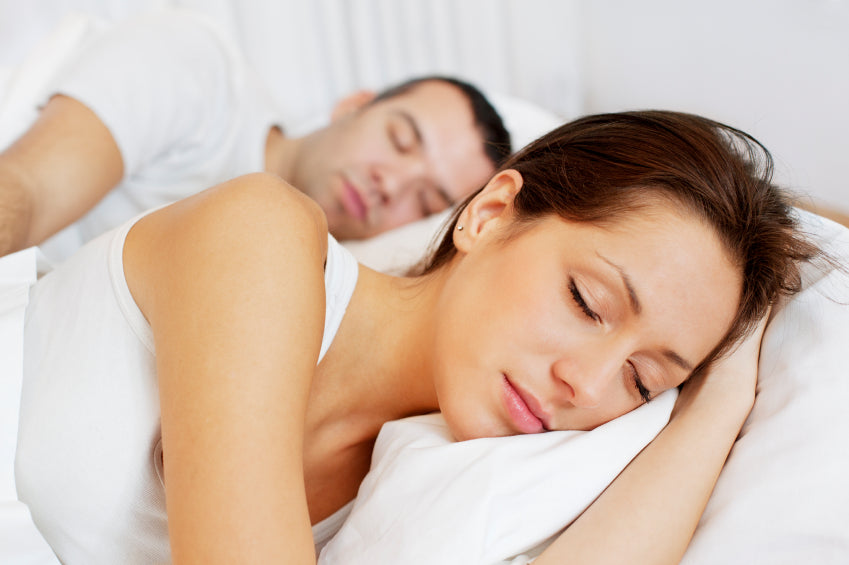Your Cart

12 Tips for Better Sleep
If you’re like most Americans, chances are you may not be getting enough sleep. Unfortunately lack of an appropriate and sufficient nights rest can have an effect on your waistline. According to a Gallup Poll, 40% of Americans fail to get an adequate amount sleep each night, logging less than 7 hours of shuteye.
Whether you are a light sleeper, work at night or have difficulty turning off your brain to rest, chronic sleep deprivation can have dangerous long-term effects on your health, including impaired immune function, inflammation, cardiovascular issues, weight gain and type-2 diabetes, as well as mental health issues such as anxiety and depression. Poor sleep may also inhibit mental and physical performance. Instead of taking a catnap on your keyboard today, read on for tips to help you fall—and stay—asleep.
Establish Patterns
Creating specific bedtime and wake-up times will help your body establish better sleep cycles. This also allows your body to sink into a sleep rhythm and know when it’s time for some shuteye.
Sanctify Your Bedroom
Turning your bedroom a sleep sanctuary can help immensely with your sleep patterns. Try blackout or dark-colored curtains, sleep on dark colored sheets and use your bed only for sleeping!
Eliminate All Light
Turn off all lamps, cover up light from the alarm clock, close the drapes and turn off the TV. Eliminating all light from your bedroom will help remind your brain and your body that it’s time for rest.
Remove Distractions
Yes—that means your cell phone, laptop and tablet too! Place these things in a drawer or face down next to your bed and avoid the temptation to look at them. Chances are you’re not missing any dire social media news in the middle of the night.
Say No to Caffeine
Afternoon caffeine may help to keep you focused and energized throughout the workday, however, it will also impede your ability to fall asleep. Try drinking some of our caffeine-free Pura-Boost in the afternoon. And remember caffeine hides in more than just coffee—even dark chocolate has a moderate amount of caffeine, so just say no!
Ditch the Alcohol
While a few glasses of wine may help you fall asleep, alcohol tends to interfere with your REM cycle, making sleep more restless in the middle of the night. Switch to caffeine-free herbal tea at night instead.
Limit Naps
Some studies have shown that short naps can actually increase productivity. With that in mind, keeping your catnaps to 30 minutes—or less—during the day can radically improve your sleep cycles.
Relax Before Bedtime
Create a soothing bedtime routine like a warm bath, a relaxing stretching session, meditation or dispersing lavender smells throughout your bedroom. This will help you turn off your brain and relax.
Keep a Notebook
Having a “worry pad” next to your bed can serve as a perfect outlet when you can’t sleep. Many of us use nighttime to mentally course through all the things we have to do the next day. Instead of fretting about them, jot them down on your pad and tell yourself you will take care of it in the morning.
Don’t Fret About Wakefulness
Waking up in the middle of the night is normal! Whether it’s to use the bathroom (you should be drinking a lot of water on the SlimGenics Program), or because you simply rolled over and found yourself awake. Instead of worrying about falling back asleep, let your body sink into the sheets and try to envision sleep—do not take out your phone, turn on the TV or get out of bed!
Find Tranquility
Whether it’s the lull of a fan, a sound machine that mimics the ocean or counting backwards from 100, we all have our little bedtime tricks that help us fall asleep. Embrace these or find one that works for you!
Get Better Shuteye with Vitamin D
Statistics show that more than 75 percent of Americans are vitamin D deficient and research has revealed that vitamin D deficiencies can lead to sleep disorders. A high-quality vitamin D supplement, like D-Slim Liquid Vitamin D could significantly improve your sleeping habits!
Talk to Your Doctor
If you have chronic or persistent sleep problems that affect your everyday life, you may need to consult with your doctor about other treatments for insomnia.
A good night’s sleep can have positive effects on many facets of your life, from heightened productivity to trimming your waistline. Good shuteye is essential for everyday health and wellbeing. Catch a few Zs and thank us later!

Comments